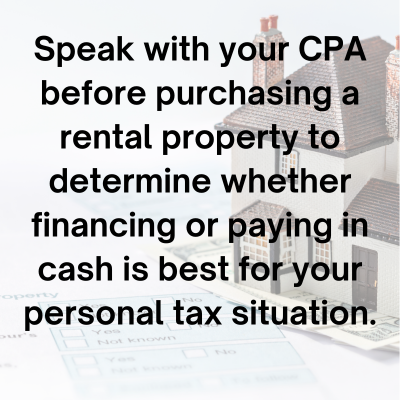Being a landlord isn’t for everyone – but for those who enjoy it, investing in rentals can be a significant source of tax deductions in addition to providing consistent cash flow.
If you’re new to investment real estate, this post will provide a useful framework for making the most of available write-offs.
Annual depreciation

Outside of a few rare scenarios, investors cannot write off the entire cost of rental a rental property in the year the purchase is made. Instead, residential rental properties are typically depreciated over 27.5 years.
This means that every year you own and rent out the property, you can deduct a portion of the property’s value as an expense to account for the natural wear and tear – but remember, only the building is depreciable, not the land.
Note: Be sure to read up on depreciation recapture to understand how the IRS treats the sale of a depreciated rental property should you decide to sell your rentals in the future.
Repairs and maintenance
All costs associated with “necessary upkeep” for the business of renting property can be fully deducted in the year the expenses are incurred.
However, any major renovations, improvements or additions that increase the value of the property cannot be written off as expenses. Instead, these costs are added to the value of your property and recovered through depreciation just like the initial purchase.

Mortgage interest
Deducting the interest portion of your mortgage payment can provide a significant write off during the early years of owning a rental. Many investors choose to finance the purchase of rental real estate even if they have the capital to pay in cash – in part, to take advantage of this major tax deduction.
Property taxes
All property taxes paid on rental property can be written off as an operating expense on your tax return. Depending on where your real estate is located, your property tax deduction can offset a significant portion of your rental income.
General operating expenses
Most expenses that are considered ordinary and necessary for managing or maintaining rental property can be fully deducted.
- Insurance premiums
- Advertising, marketing and tenant screening
- Landlord paid utilities and HOA fees
- Professional services including property management, bookkeeping and legal fees
- Office supplies, tools and technology needed for administration
- Travel and mileage for checking on the property, doing repairs or meeting with tenants
- You may qualify for a home office deduction, depending on whether your rental activity is considered a business or passive investment by the IRS
Is investing in real estate right for you?
Making the decision to own and manage rentals is more complicated than looking only at the tax advantages. Always speak with a trusted advisor to discuss the full picture before taking the leap into becoming a landlord. When you’re ready, our team is here to help you make the right move for your financial future and personal goals.





